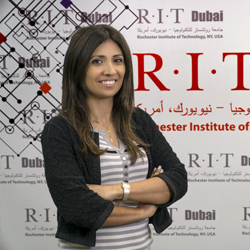Bachelor of Science in Computing Security
In RIT’s computing security degree you’ll learn to preserve assets, identify security vulnerabilities, prove threats occurred, and design strategies for data recovery.
Program Overview
As technology advances at a rapid rate, protecting individuals, companies, government entities and global organizations from cyber threats is becoming a huge sector, with career opportunities spanning the globe. Our Bachelor of Science in Computing Security has been designed to prepare you to excel in this rapidly growing area.
If you love computer science, crave a program that offers a hands-on curriculum and a range of active learning experiences and gives plenty of opportunities for independent exploration at an advanced level, the Bachelor of Science in Computing Security will be a perfect. Considered a leading program in computing and network security and forensics by industry experts including the U.S. Department of Homeland Security, the Department of Defense and the National Security Agency, the degree offers you a high level of specialization beyond what is provided by more general majors in Information Systems or Information Technology.
You’ll begin by getting to grips with a wide breadth of computing disciplines including programming, scripting, databases, computing security, cryptography, security policy, networks, systems and network administration. You’ll then have the chance to focus on a particular area of security such as forensics, mobile device forensics or network/computing system security.
By the time you graduate you will be an expert in the identification of computer security vulnerabilities, the detection of computer security exploits, and the prevention or mitigation of the resulting attack, making you highly employable. Your job responsibilities may include security assessment, cybersecurity, network security, computer and network forensics, cryptography, penetration testing, information security risk management, and cyber policy & law.
Mission Statement
The mission of the Computing Security program is to advance the state of the art in cybersecurity knowledge and provide world-class education in the knowledge, skills, and mindset needed to have a great career as a cybersecurity professional.
Program Educational Objectives
The Computing Security Program Educational Objectives (PEO) are broad statements that describe what graduates are expected to attain within a few years of graduation. Program educational objectives are based on the needs of the program’s constituencies. The Computing Security faculty, in conjunction with its constituents, has established the following program educational objectives:
PEO 1: Graduates will be employable in cyber security and cyber forensics professional positions in both the private and public sectors.
PEO 2: Graduates will have appropriate foundational skills to become lifelong learners within their field.
PEO 3: Graduates will be prepared to work as team members and to adopt leadership positions as necessary.
PEO 4: Graduates will be prepared for further academic study and will be able to make contributions to the academic disciplines of cyber security and cyber forensics.
Program Learning Outcomes
-
Analyze a complex computing problem and to apply principles of computing and other relevant disciplines to identify solutions.
-
Design, implement, and evaluate a computing-based solution to meet a given set of computing requirements in the context of the program’s disciplines.
-
Communicate effectively in a variety of professional contexts.
-
Recognize professional responsibilities and make informed judgments in computing practice based on legal and ethical principles.
-
Function effectively as a member or leader of a team engaged in activities appropriate to the program’s discipline.
-
Apply security principles and practices to the environment, hardware, software, and human aspects of a system
-
Assess the ethical ramifications of working in the security field
Professional positions in computing security are found in nearly every area of commerce. From small local businesses to large multi-national corporations, they all depend on a complex networking infrastructure to conduct their business and require security professionals to maintain these systems. As a graduate of Computing Security from RIT Dubai, you will be expertly prepared to provide the support demanded by enterprises of all sizes, as well as national, state, and local security agencies. Career options include system security analysts and designers, enterprise system security architects, or IT systems forensics consultants and investigators.
Students are required to complete 126 semester credit hours of core courses and advanced courses as well as cooperative education. Core courses include a programming sequence, an ethics course, a computer networking and system administration sequence, and foundation courses in computer and network security. Advanced courses allow students to design the focus of their information security coursework.
Typical Course Sequence
|
Year One |
||
|
Course Code |
Course Title |
Credit Hours |
|
CSEC - 140 |
Introduction to Cybersecurity |
3 |
|
GCIS - 123, 124 |
Software Development and Problem Solving I, II |
8 |
|
UWRT - 150 |
General Education – First-Year Writing: UWRT-150 FYW: Writing Seminar (WI) |
3 |
|
MATH - 181, 182 |
Project-based Calculus I, II |
8 |
|
General Education - Artistic Perspective A : Islamic Culture Course |
3 | |
|
MATH - 190 |
Discrete Mathematics for Computing |
3 |
|
NSSA - 241 |
Intro to Routing and Switching |
3 |
|
YOPS - 010 |
RIT 365: RIT Connections |
0 |
|
Year Two |
||
|
CSEC - 201 |
Programming of Information Security |
3 |
|
MATH - 251 |
Probability and Statistics I |
3 |
|
CSEC - 202 |
Reverse Engineering Fundamentals |
3 |
|
NSSA - 221 |
Systems Administration I |
3 |
|
MATH - 241/ MATH-252 |
Linear Algebra/ Prob & Stats II |
3 |
|
PHYS - 211, 212 |
Lab Science Sequence |
8 |
|
NSSA - 245 |
Network Services |
3 |
|
CSEC - 99 |
Co-op Prep Seminar |
0 |
|
General Education -Ethical Perspective |
6 | |
|
Cooperative Education (summer) |
Co-op | |
|
Year Three |
||
|
Computing Security Electives 1, 2 |
6 | |
|
CSCI - 462 |
Introduction to Cryptography |
3 |
|
PUBL - 363 |
Cyber Security Policy and Law |
3 |
|
General Education - Ethical Perspective |
3 | |
|
CSEC - 380 |
Principles of Web App Security |
3 |
|
CSEC - 472 |
Authentication and Security Models |
3 |
|
ISTE - 230 |
Introduction to Database and Data Modeling |
3 |
|
Free Electives 1, 2 |
6 | |
|
Cooperative Education (summer) |
Co-op | |
|
Year Four |
||
|
Computing Security Electives 3, 4, 5, 6 |
12 | |
|
General Education - Immersion 1 |
3 | |
|
General Education - Immersion 2, 3 |
6 | |
|
PHIL - 102/202/306 |
Ethics Elective |
3 |
|
CSEC - 490 |
Capstone in Computing Security (WI) |
3 |
|
Open Elective 3, 4 |
6 | |
|
Total Credits - 126 |
||
Advanced Electives
Students complete the advanced security electives that expand students’ knowledge in one of several disciplines of security, including system security, network security, forensics, malware, secure software development, database and application security, security evaluation, or theory.
A matriculated student in the BS in Computing Security is required to take 6 advanced elective courses. Three of the electives must come from one of the four clusters and the other three from the approved general list.
-
Network and System Security
-
Forensics and Malware
-
Software Security, or
-
Security Management and Evaluation
Currently, RIT Dubai is offering the following advanced courses. CSEC - 461, 462, and 471 are from the Network and System Security cluster and CSEC - 520, 463, and 465 belong to the approved general list of advanced electives.
-
CSEC-461 Computer System Security
-
CSEC-462 Network Security and Forensics
-
CSEC-471 Penetration Testing Frameworks and Methodologies
-
CSEC-520 Cyber Analytics and Machine Learning
-
CSEC-463 Sensor Network Security
-
CSEC-465 Network & System Security Audit
To graduate, students need to complete all the requirements as listed in the curriculum. Click here for the graduation policy.
Click here to download undergraduate catalogue for complete descriptions of each course within the program.
Computer Networking Lab
This lab is divided into four clusters. Each cluster has two sub-clusters with three adjacent PCs. A cabinet with at least one server, firewall, two routers, and four switches is dedicated for each of the four clusters. UTP and Console cables are available for students to connect these devices into a LAN, WAN and they can connect the event to the internet to install any additional required software or tool. This lab service mainly some courses such as CSEC 244 routing the switching, CSEC network security, and forensics as well as many other courses.
Computing Security Lab
The computing security lab provides students with a PC and access to the DTLAB in order to support a wide range of courses. Examples of these courses are penetration testing, security auditing, cyber defense, network forensic, digital forensics, and many more. Through this lab, students can coordinate the work to conduct security experiments that can include building a vulnerable environment, conduct various attacks, acquire information related to these attacks, and then try to mitigate them. Access to the DTLAB provides students with private cloud support that allow them to spin various virtual machines, connect them via a network, and study the various security issues.
Digital Transformation Lab
The digital transformation lab at RIT Dubai is funded by the TRA ICT fund and was established in 2018. The aim of this lab is in the research and development of secure and smart solutions across a number of verticals that support digitization for government, enterprise, and education.

Dr. Muhieddin Amer
Professor and Chair

Dr. Abdulla Ismail
Professor

Dr. Wesam Almobaideen
Professor

Dr. Boutheina Tlili
Associate Professor

Dr. Khalil Al Hussaeni
Assistant Professor

Dr. Omar Abdul Latif
Assistant Professor

Dr. Huda Saadeh
Assistant Professor

Dr. Kevsar Ovaz Akpinar
Assistant Professor

Dr. Jinane Al Mounsef
Assistant Professor

|
Eyad Shihabi Managing Director, BT |
Ghada Elkeissi Head of Professional Services, AWS |
||||||||||
|
Taha Khalifa Regional General Manager, Middle East Intel Corp |
Dr. Ayman ElNashar VP and Head – Technology Architecture, Emirates Integrated
|
||||||||||
|
Ghanim Al Falasi Senior VP – Corporate Services Dubai Silicon Oasis Authority
|
Diyaa Zebian Executive Partner Archinnova |
||||||||||
|
Dr. Mahmoud Sherif Head of Technology and IT Strategy Emirates Integrated
|
Bashar Kilani Territory Executive - Middle East IBM |
||||||||||
|
Dr. Raed Shubair Senior Advisor, Office of Undersecretary for Research Affiliate, MIT
|